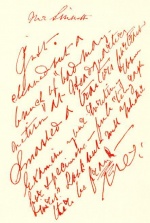Plaster Plaque (phenomenon)
The Plaster Plaque or Plaster Cast phenomenon was produced by Master M., and involved Mr. Sinnett at Allahabad, and Mme. Blavatsky and others in Bombay.
Phenomenon at Allahabad
On March 11, 1882, Mr. Sinnett had returned home in the evening to find several telegrams awaiting him. Inside the fastened envelope of one of them he found a little folded note from Master M. that said:
Mr. Sinnett
Just cleaned out a bunch of "bad magnetism" at Headquarters. Smashed a traitor's portrait. Examine your writing room for specimen—and "telegraph wires." Look out well whether there be FRAUD—
M.[1]
After reading the note, Mr. Sinnett set out to look for the "specimen". He informed:
The note made me search in my writing-room for a fragment of a plaster bas-relief that M_____ had just transported instantaneously from Bombay. Instinct took me at once to the place where I felt that it was most likely I should find the thing which had been brought — the drawer of my writing-table exclusively devoted to occult correspondence; and there, accordingly, I found a broken corner from a plaster slab, with M_____’s signature marked upon it.[2]
Because the note mentioned the Headquarters (at the time in Bombay), he decided to send a telegraph there:
I telegraphed at once to Bombay to ask whether anything special had just happened, and next day received back word that M_____ had smashed a certain plaster portrait and had carried off a piece. In due course of time I received a minute statement from Bombay, attested by the signatures of seven persons in all as regards all essential points.[3]
Event at Bombay
In Bombay, Mme. Blavatsky, Tookaram Tatya, Gwala K. Deb, Damodar K. Mavalankar and Malavarman Nathavarman were seated at their tea at the dining table when the phenomenon started. The statement Mr. Sinnett received from Bombay states:
We all suddenly heard a knock, a loud noise as of something falling and breaking, behind the door of Madame Blavatsky’s writing-room, when there was not a soul there at the time. A still louder noise was heard and we all rushed in. The room was empty and silent; but just behind the red cotton door, where we had heard the noise, we found fallen on the ground a Paris plaster mould representing a portrait, broken into several pieces. After carefully picking the pieces up, to the smallest fragments, and examining it, we found the nail on which the mould had hung for nearly 18 months, strong as ever in the wall. The iron wall-loop of the portrait was perfectly intact and not even bent. . . . We spread the pieces on the table, and tried to arrange them, thinking they could be glued, as Madame Blavatsky seemed very much annoyed, as the mould was the work of one of her friends in New York. We found that one piece, nearly square and of about two inches, in the right corner of the mould, was wanting. We went into the room and searched for it, but could not find it.[4]
Soon afterwards Madame Blavatsky suddenly went to her room and came out with a note from the Master saying that the missing piece had been taken to Allahabad and that they should collect and carefully preserve the remaining pieces.
The portrait bore the name E. Wimbridge, who accompanied the Founders to India in 1879, along with Rosa Bates. By 1882 he had turned against them.
Online resources
Articles
- A.P. Sinnett's Deposition to the Society for Psychical Research - "The Piece of Plaster Plaque Phenomenon" published by Blavatsky Study Center.
- A Note from Mahatma Morya to A.P. Sinnett published by The Blavatsky Archives
Notes
- ↑ See A Note from Mahatma Morya to A.P. Sinnett at http://www.blavatskyarchives.com/Mahmorya5.htm
- ↑ Alfred Percy Sinnett, The Occult World (London: Theosophical Publishing House, 1969), 163.
- ↑ Alfred Percy Sinnett, The Occult World (London: Theosophical Publishing House, 1969), 163-164.
- ↑ See A.P. Sinnett's Deposition to the Society for Psychical Research - "The Piece of Plaster Plaque Phenomenon" at http://www.blavatskyarchives.com/sinnettdeposition.htm
